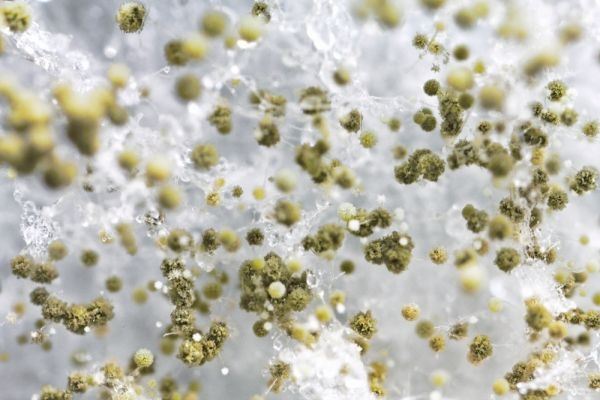It’s spring again, and you know what that means—longer days, more rain, and the return of allergy season. But what if there was something else triggering your allergies, other than the normal pollen increases? If you have ever wondered if your spring allergy symptoms could be tied to mold exposure, you’re not alone.
When there are excess mold spores in the air, they can have all kinds of adverse effects on the body, including allergy symptoms like breathing problems, increased coughing and/or sneezing, as well as itchy throats, eyes, and skin. The tricky part is that mold affects everybody, though some people have a more severe reaction than others. Some people only feel minor side effects from mold growth, whereas others may experience full-on allergy attacks.
While spring triggers all kinds of allergy symptoms, mold spores linger in the air year-round. That said, while colder temperatures can keep mold allergies at bay, they often start to reappear again when warmer temperatures return in the spring. Mold does not grow outdoors when it is cold out, so unless you are experiencing mold growth in your home, you may not feel the effects of mold spores in fall and winter. And keep in mind, using your heater also helps keep mold growth at bay, so even the air inside your home should be less conducive to mold growth during these seasons. But again, all this changes when the spring rolls around, and you are more likely to experience the effect of mold spores in and out of your home.
Signs You May Be Dealing with a Mold Allergy this Spring
While pollen and mold allergies are very similar, 10% of the population suffers from specific mold allergies. This means that it can be hard to tell whether the allergic reactions you are having in spring are from mold or pollen, which, in turn, makes it harder to treat specific mold allergies. Fortunately, there are a few ways to tell if you are dealing with a mold allergy during the springtime.
These include:
- Postnasal drip: Postnasal drip refers to the secretions from your nose that drain down the throat, leading to congestion and coughing. These secretions often occur because of allergies or the common cold. However, if you do not feel sick and have been taking your allergy medication as usual, then increased postnasal drip may be linked to mold spores.
- Frequent Coughing: Some allergies cause coughing, but many don’t. If you feel like you are coughing more than usual, but the rest of your allergy symptoms are not activated, this could be due to springtime mold growth.
- Increased Nasal Congestion: Oftentimes, people with allergies feel a certain amount of nasal congestion year-round. Nasal congestion already tends to be especially bad during the spring, though if you are experiencing more congestion than usual this year, it could be tied to mold.
- Increased allergy symptoms after it rains: Mold growth is directly related to increased moisture, so if your allergies always feel worse after it rains, this could be due to mold, rather than pollen.
- Worse Allergy Symptoms Overall: Remember, you know your body better than anyone else, and you are the best judge of your allergy symptoms. That’s why if your allergies are just worse overall this spring, you should consider whether mold could be a factor.
Cal FP Property Restoration for Your Mold Remediation Needs
If you are dealing with a mold allergy, the good news is that it is possible to treat your symptoms with allergy shots. You may also be able to reduce the severity of your mold allergies by mitigating external factors, like opening your windows at night to alleviate humidity levels, and closing them during the day, when mold is more active, to prevent mold spores from getting in. This will help you achieve proper ventilation without affecting the larger temperature of your household. And of course, it is never a bad idea to purchase a dehumidifier, so moisture levels in your home never get too high.
While you may not be able to affect the amount of mold outdoors this spring, you can make sure mold isn’t affecting your allergies indoors by hiring our experts at FP Property Restoration. Our licensed mold remediation team offers inspection and testing to determine whether you have a mold problem, and are proud to provide long-term solutions to help you get rid of your current mold problem and reduce mold growth in the future. Call now to schedule an appointment, and remember that FP Property Restoration is always here for your property’s needs.
Our licensed mold remediators are available by phone at (888) 408-2335, or you can contact us online.


